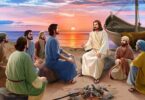
Theme: Jesus the rock gushes forth life-giving water.
Scripture: Ex. 17:3-7; Ps. 94:1-2, 6-9; Rom. 5:1-2, 5-8; Jn. 4:5-42
Pope Francis recognised a miracle attributed to the intercession of Bl. Devasahayam Pillai on 21st Feb 2020, clearing his way to canonisation. He will be the first lay catholic in India to become a saint. He was a staunch Hindu by birth. He was born in 1712. He was a court official of King Marthanda Verma. It is said that after the baptism of Devasahayam, was marched in the city by the soldiers over the period of a few days. He was treated like an animal. They had painted red and black spots on his body. He was paraded on a buffalo. It was a custom of parading criminals in those days. It was a method of torture; he was beaten every day with eighty stripes. A powder of pepper was rubbed in his wounds and nostrils, exposed to the sun. He was made to drink muddy water. He used to beg at the soldiers to give him a freshwater but they would refuse him. It is said that he was at Puliyoorkuichi in Tamilnadu, India; he struck the rock with his elbows. God fed him with the freshwater. Today, People drink water from the same spring and are getting healed. The gushing of water is sign of God pouring out His mercy for his beloved saint. We find a similar expressions in today’s liturgy.
In the first reading from the book of Exodus, we are told that God gave the people of Israel water from the rock. Readings of the books of Pentateuch give us three different occasions in the Old Testament where God provided water to the people of Israel. The first incidence took place in Marah. After the people of Israel left the land of Egypt, they walked for three days in the wilderness. They had no water. The people grumbled against Moses, “what shall we drink?” The Lord helped Moses to turn bitter water into sweet water (Ex. 15:22-26). At the second instance, the one that is read today. People once again grumbled against God for want of water. God gave them water with the help of Moses. Moses renamed these places Massah and Meribah. The third incident took place at Kadesh where once again the people of Israel grumbled at Moses (Num. 20:1-5). Moses struck the rock twice and gave water to the people. Each of these incidences, the people of Israel exhibited their spiritual weaknesses i.e. ungratefulness and unbelief. They challenged God. They forgot His marvellous deeds which He had performed for them in the land of Egypt. God had made promise to them that He would be standing before them. People just forgot about it that He was right in their midst. People forgot to experience His mercy which gushed out from the rock.
The Gospel narrates a beautiful story of a woman. She was a Samaritan. The Samaritans had rivalry with Jews because they hated them. The Jews felt that the Samaritans had betrayed their Jewish heritage by intermarrying with Assyrians after the Assyrians invasion. They were not considered part of their rituals and festivals. The Samaritans therefore decided to built a temple for themselves on the Mount Geirzim. It was destroyed by the Jewish General in 129 B.C. The hostility had grown deep and wide. Secondly, that Samaritan woman might have been a moral outcast due to her immoral behaviour. She had confessed that she had five husbands and she was staying with one who was not her husband. Therefore, she was not allowed to fetch water at the regular hours. She was a social outcast. She was just like the people of Israel in the wilderness thirsty, seeking life giving water to quench her spiritual thirst. She was thirsty for love. Jesus without any mediation of Moses reaches out to her. Jesus heals her brokenness and sinfulness. She receives mercy from the Lord and her thirst gets quenched.
We are also thirsty like Bl. Devasahayam Pillai, the people of Israel and the Samaritan woman. Each one is in need of life giving water because our lives have become dry, hard and parched land. There is no joy and happiness anymore. We are burdened with anxiety, worries, tensions, problems, etc. There is no meaning in our lives. We do not know who will quench our thirst. We are lost in our struggle. In the midst of this painful situation, we need to remember that Jesus once again comes to us wherever we are, even in our sinfulness.
The New Testament writings depicted Jesus as the rock while reflecting on the incidences from the Old Testament. Firstly, Jesus inspired by the Psalmist (Ps. 118:22) said about himself that he was the stone that was rejected by the builders this became the chief corner stone (Mt. 21:42, Lk. 20:17, Mk. 12:10). The same quote is repeated in the Acts (4:11) as well as in the first letter of St. Peter (1 Peter 2:7). Secondly, St. Paul received great insight in the writing of Prophet Isaiah (Is. 8:15). He saw Jesus being the stone of stumbling and a rock of offense. He said, “he who believes in Him will not be disappointed” (Rom. 9:33). Jesus being the rock was broken on the Easter night. That rock is gushing out mercy and forgiveness till today. The greatest feast of Easter, every Eucharistic celebration and the sacraments are the reminder of breaking of Jesus, the rock into abundance of mercy and forgiveness. Jesus the rock promised Samaritan woman that anyone who drinks the water that he gives, will never be thirsty again, the water that he shall give will turn into a spring inside him, welling up to eternal life. Jesus, the rock who calls us today, “let anyone who is thirsty come to me, and let the one who believes in me drink”. (Jn. 7:37) We need to believe in the promise of Jesus and turn to him with repentant heart. He will surely quench our thirst.






